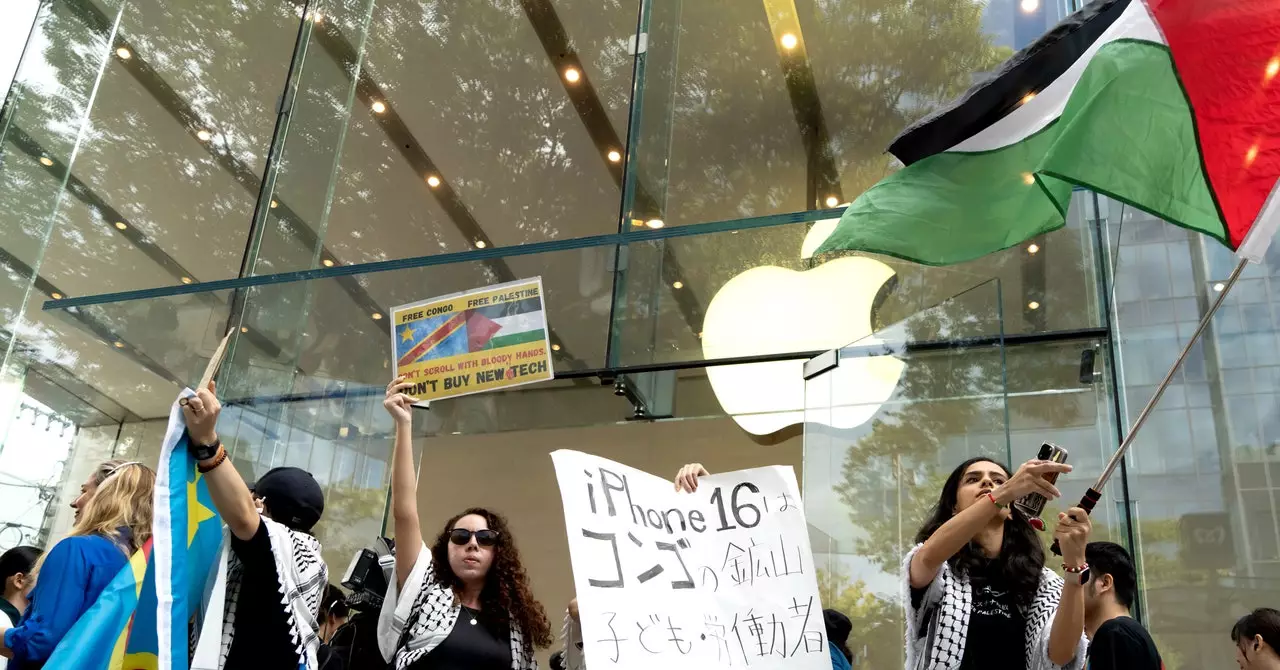On a day celebrated by many as one of technological achievement and innovation, Apple Stores around the globe buzzed with excitement as customers queued up to purchase the highly anticipated iPhone 16. However, interwoven with this excitement was an undercurrent of dissent as protests unfolded at various locations. These demonstrations, organized largely by a group of current and former Apple employees, sought to raise awareness about the darker aspects of Apple’s supply chain. Holding banners emblazoned with messages condemning Apple’s alleged complicity in human rights abuses, the protesters shone a spotlight on issues that many consumers might prefer to overlook during their shopping experience.
The protesters rallied for critical issues surrounding the mining of cobalt—an essential mineral in the production of lithium-ion batteries. Cobalt is predominantly sourced from the Democratic Republic of the Congo (DRC), where mining operations are frequently marred by hazardous conditions, exploitation of workers, and the use of child labor. Despite Apple’s assurances that it does not source minerals from unethical sources, the complexities of tracking supply chains pose significant challenges. The recent removal of 12 suppliers, as per Apple’s own admission, highlights the difficulty of maintaining ethical sourcing in an increasingly scrutinized global economy. Furthermore, growing calls for accountability from the Congolese government concerning “blood minerals” in Apple’s supply chain contribute to the mounting pressure on the tech giant.
In addition to addressing cobalt sourcing, the protests also voiced a demand for Apple to publicly address the humanitarian crisis in Gaza. Many human rights experts have labeled the ongoing conflict as genocidal, amplifying calls for corporations like Apple to take a definitive stance. By aligning their message with broader global issues, the protesters sought to establish a narrative in which consumer technology companies cannot turn a blind eye to human suffering, regardless of geographical boundaries. The protesters’ dual focus—on sourcing practices and global humanitarian crises—encapsulates a growing skepticism surrounding corporate responsibility in an era where social issues increasingly intersect with daily life.
A Coordinated Movement
The group behind these protests, known as Apples Against Apartheid, originated from an earlier initiative called Apples4Ceasefire. A coalition of five current employees alongside several former workers, the group is particularly notable for stitching together the tapestry of local activism with global concerns. Their collaborative effort with organizations such as Friends of the Congo has allowed them to gain significant momentum across various cities, including Bristol, Tokyo, and Cape Town. With social media playing a pivotal role in mobilizing supporters, images of the protests at iconic Apple Store locations serve as visual reminders of the fractured relationship between consumerism and ethical responsibility.
The timing of these protests, intentionally placed on the launch day of a flagship product, indicates a strategic approach to maximize visibility and impact. Protesters aimed to disrupt a milestone that embodies consumer culture, forcing shoppers to grapple with the larger implications of their purchases. In cities like Berlin, where the turnout was substantial, chants overpowered the buzz of the store, illustrating a deliberate attempt to challenge the narrative that equates a product launch solely with excitement and joy. By confronting Apple in their spaces of commerce, the protesters have deemed it essential to deliver their message to the very consumers who inadvertently fuel unethical practices.
Apple’s response to these protests remains to be seen, but it is worth noting that the tech giant operates within a landscape increasingly characterized by public scrutiny. The crux of this ongoing dialogue is not merely about consumer goods but about the broader implications of technological advancements. As consumers, activists, and corporations interact, the stakes carry profound significance that goes beyond the product itself. Such activism aims to inspire reflection not only among Apple consumers but across all sectors, advocating a more sustainable and ethical approach to consumption. Ultimately, it calls for rethinking how we engage with brands—informed by a consciousness of the global tapestry of human rights struggles that underpin the products we choose to embrace.

